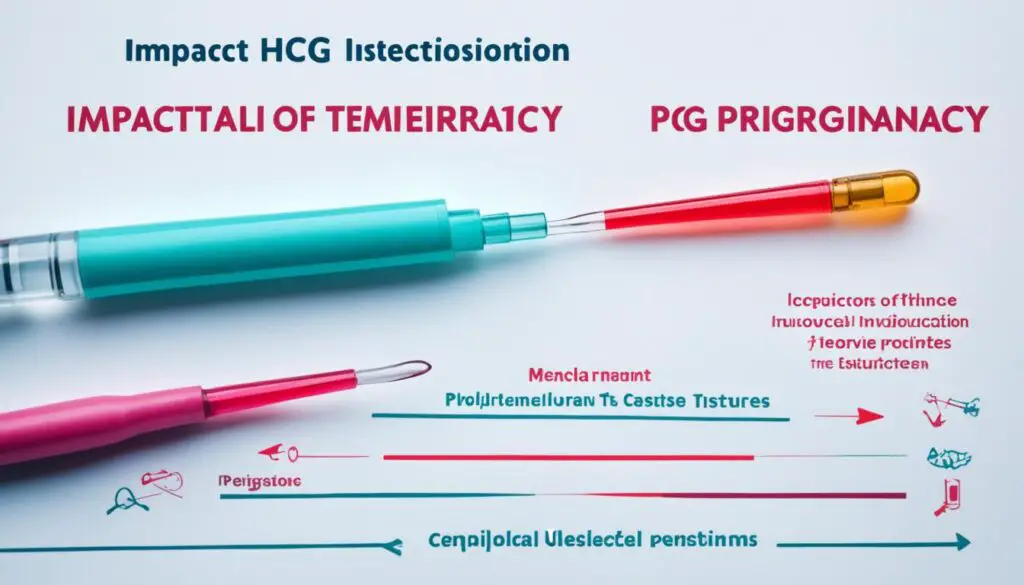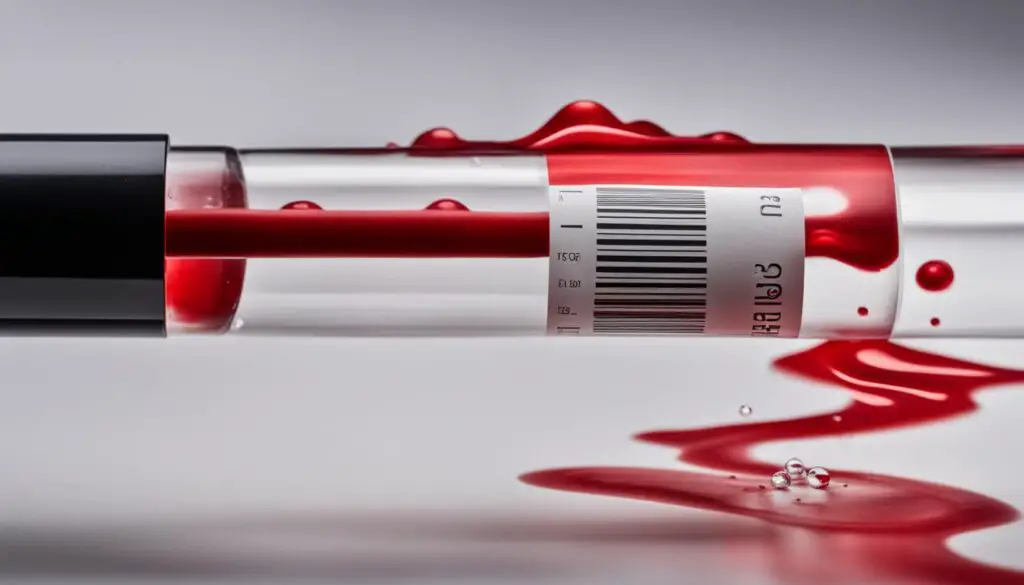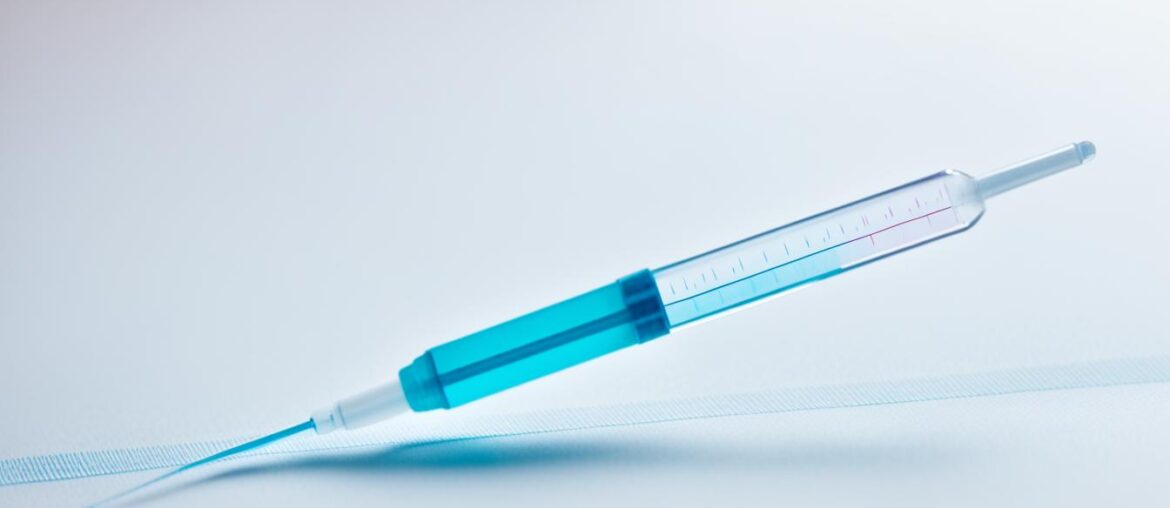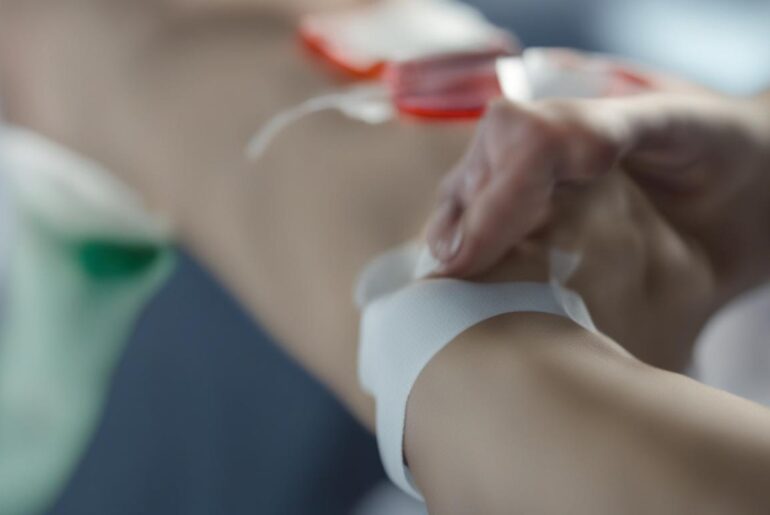Did you know that HCG injections, commonly used in fertility treatments, can affect the accuracy of pregnancy test results? It’s true! Taking a pregnancy test too soon after an HCG injection can lead to misleading or inaccurate results. HCG, or human chorionic gonadotropin, is the hormone detected in pregnancy tests, and it takes time for the injected HCG to clear from the body. Waiting for the appropriate time or following your doctor’s instructions is crucial for obtaining reliable and accurate results.
Key Takeaways:
- HCG injections used in fertility treatments can impact pregnancy test accuracy.
- It takes about 10 days for the injected HCG to clear from the blood and urine.
- Testing too soon after an injection can result in false positive results.
- Waiting for the recommended time or following doctor’s instructions is essential for accurate results.
- Blood-based tests are often more accurate than home urine-based tests.
Understanding hCG and its Role in Pregnancy Testing
Human Chorionic Gonadotropin (hCG) is a vital hormone produced during pregnancy that plays a crucial role in pregnancy testing. This hormone is the primary indicator used in both blood and urine-based pregnancy tests to detect the presence of pregnancy. Additionally, hCG is also commonly used in fertility treatments to induce ovulation and promote the release of eggs.
The role of hCG in pregnancy testing is closely linked to its resemblance to luteinizing hormone (LH), another hormone involved in the reproductive process. LH levels rise before ovulation to trigger the release of an egg. Similarly, when hCG is injected, it causes a similar response in the ovary, inducing ovulation.
Understanding the correlation between hCG and fertility treatments is essential for obtaining accurate results in pregnancy testing. By recognizing the importance of hCG as a pregnancy hormone and its involvement in the ovulation process, individuals can ensure proper timing and interpretation of test results.
“hCG, the hormone detected in pregnancy tests, is produced during pregnancy and plays a crucial role in fertility treatments by inducing ovulation.”
hCG and Pregnancy Testing
During early pregnancy, hCG levels in the body increase rapidly. This increasing concentration of hCG can be detected through both blood and urine-based pregnancy tests, allowing for early pregnancy detection.
In urine-based pregnancy tests, the test strip contains antibodies that specifically bind to hCG molecules. When urine is applied to the test strip, these antibodies react with the hCG present, creating a visible signal that confirms the presence of pregnancy.
Blood-based pregnancy tests are more sensitive, capable of detecting lower levels of hCG hormone. These tests are often conducted in a healthcare setting and involve the analysis of a blood sample. The results provide precise information about the hCG levels in the bloodstream, giving a more accurate understanding of early pregnancy detection.
Role of hCG in Fertility Treatments
Fertility treatments, such as in vitro fertilization (IVF) or intrauterine insemination (IUI), frequently involve the administration of hCG. This hormone assists in the maturation of eggs and stimulates ovulation, increasing the chances of successful fertilization.
The use of hCG injections in fertility treatments ensures the synchronization of ovulation with the fertilization process. When hCG is introduced through injections, it mimics the natural LH surge that triggers ovulation. This stimulates the ovaries to release mature eggs, optimizing the effectiveness of fertility treatments.
Figure 1: A visual representation of the relationship between hCG and the ovulation process in fertility treatments.
| Pregnancy Testing | Fertility Treatments |
|---|---|
| Detects pregnancy through hCG levels | Uses hCG to induce ovulation |
| Performed using urine or blood samples | Involves hCG injections for stimulation |
| Enables early pregnancy detection | Increases chances of successful fertilization |
Timing is Key: The Impact of hCG Injections on Pregnancy Tests

The timing of taking a pregnancy test after an hCG injection is crucial to obtain accurate results.
It takes about 10 days for the injected hCG to clear from the blood and urine.
If a urine pregnancy test (UPT) is taken too soon, within 10 days or less after the hCG injection, it may result in a false positive.
This is because the test detects the medication still present in the blood and urine, rather than the hCG produced by a pregnancy.
Waiting for the recommended time or following your doctor’s instructions for a blood test ensures accurate results.
Check the table below for a visual representation of the impact of hCG injections on urine pregnancy tests:
| Timing | Urine Pregnancy Test Result |
|---|---|
| Within 10 days of hCG injection | False positive due to detecting the medication |
| After 10 days of hCG injection | Accurate result detecting hCG produced by pregnancy |
Managing Expectations: Testing Recommendations for HCG Injections
When it comes to taking a pregnancy test after an HCG injection, managing expectations is crucial. While the wait may be challenging, it’s important to understand that home pregnancy tests may not always provide the most accurate results. Doctors typically recommend blood pregnancy tests for greater accuracy when dealing with HCG injections.
For the most reliable results, it is advisable to wait at least 10 days after the injection or follow your healthcare provider’s instructions. A blood pregnancy test conducted 12-14 days after the injection provides a more accurate assessment of pregnancy. Relying solely on home pregnancy tests or testing too early may lead to inaccurate results, which can cause unnecessary confusion and anxiety.
Remember, HCG injections can impact the accuracy of pregnancy tests, so it’s best to follow the recommended guidelines and seek medical advice for precise readings. Be patient, give the HCG time to clear from your system, and trust in the expertise of healthcare professionals.
Testing Recommendations for HCG Injections:
- Wait for at least 10 days after the injection.
- Follow your doctor’s instructions for a blood pregnancy test 12-14 days after the injection.
- Avoid relying solely on home pregnancy tests for accurate results.
- Manage expectations and understand that waiting is necessary for reliable readings.
Advantages of Blood Pregnancy Test:
“Blood pregnancy tests offer greater accuracy and provide a clearer understanding of hormone levels compared to home pregnancy tests.” – Dr. Samantha Thompson, OB/GYN
By following these testing recommendations, you can ensure more accurate results and minimize confusion. Remember, patience is key, and seeking professional guidance is essential when dealing with the impact of HCG injections on pregnancy tests.
| Test Type | Accuracy | Recommended Timing |
|---|---|---|
| Blood Pregnancy Test | High | 12-14 days after the HCG injection |
| Home Pregnancy Test | Moderate | At least 10 days after the HCG injection |
The Role of Medications in Pregnancy Test Accuracy

Certain fertility medications can interfere with hCG measurements and impact pregnancy test accuracy. Medications like Clomid and human menopausal gonadotropin (hMG) are commonly prescribed to induce ovulation and support egg maturation in fertility treatments.
These medications often contain synthetic forms of hCG, which can lead to false positive results if a pregnancy test is taken too soon. It takes approximately 10 days for the synthetic hCG to clear from the body, so testing too early may detect the medication rather than the hCG produced in pregnancy.
In such cases, it is best to follow your doctor’s instructions and wait to get an in-office blood hCG test for accurate results. Blood tests are more reliable in detecting pregnancy and can provide a clearer understanding of hCG levels.
By following your doctor’s guidance and waiting for the appropriate time to take a pregnancy test, you can ensure accurate results and avoid unnecessary confusion.
Potential Interference of Exogenous HCG on Pregnancy Tests
When undergoing fertility treatments, such as hCG injections to induce ovulation, it is important to be aware of the potential interference that exogenous hCG can have on pregnancy test results. Research has shown that the sensitivity of modern pregnancy tests has increased, making them more likely to detect exogenous hCG and potentially leading to false positive results.
Low-threshold pregnancy tests, which are designed to be highly sensitive to even small amounts of hCG, can be particularly vulnerable to interference. These tests may detect the exogenous hCG present in the body, leading to a false positive result even when a pregnancy is not present. On the other hand, traditional high-threshold pregnancy tests may not be sensitive enough to detect exogenous hCG, potentially resulting in a false negative result.
To navigate this potential interference effectively, it is crucial to consider the type of pregnancy test being used and the timing of the test relative to the hCG injection. If you have recently undergone an hCG injection and are concerned about the accuracy of a home pregnancy test, it may be beneficial to consult with your healthcare provider and consider a blood-based test, which can provide more accurate readings.
Now, let’s take a look at a comprehensive table comparing the features and potential interference of low-threshold and high-threshold pregnancy tests:
| Pregnancy Test Type | Sensitivity | Potential Interference from Exogenous hCG |
|---|---|---|
| Low-Threshold | High (detects low levels of hCG) | May lead to false positive results due to interference from exogenous hCG |
| High-Threshold | Lower (requires higher levels of hCG for detection) | Less likely to detect exogenous hCG, potentially resulting in false negative results |
It is crucial to note that individual experiences may vary, and consulting with a healthcare professional is always recommended for personalized guidance. Understanding the potential interference of exogenous hCG on pregnancy tests can help you make informed decisions and ensure accurate results during your fertility journey.
Factors Influencing Pregnancy Test Accuracy
When it comes to pregnancy tests, several factors can impact their accuracy. Understanding and avoiding these factors is crucial to ensure reliable results. Let’s take a closer look at some of the key factors:
1. False Negative Results
A false negative result occurs when a pregnancy test incorrectly indicates that a woman is not pregnant when she actually is. This can happen due to testing too early, improper test use, or diluting urine by drinking excessive fluids before testing.
2. Improper Test Use
Proper usage of a pregnancy test is essential for accurate results. Failing to follow the instructions provided with the test, such as not holding the test stick in urine for the specified duration or misinterpreting the test result, can lead to erroneous outcomes.
3. Testing Too Early
Testing too early can be a common mistake that affects the accuracy of pregnancy tests. It takes time for the pregnancy hormone hCG to build up to detectable levels in the body. Testing before sufficient hCG is present can result in false negative readings.
4. Expired Tests
Using an expired pregnancy test can lead to inaccurate results. Over time, the chemicals in the test strip may degrade, affecting its sensitivity and reliability. It is important to check the expiration date before using a test and ensure that it is still valid.
5. Diluting Urine
Drinking excessive water or other fluids before taking a pregnancy test can dilute the concentration of hCG in the urine, potentially leading to false negative results. It is best to test with the first-morning urine, as it is typically more concentrated and has a higher likelihood of accurately detecting pregnancy.
To ensure accurate pregnancy test results, it is recommended to carefully follow the instructions provided with the test, wait for the appropriate time after potential conception, avoid diluting urine, and use a valid, unexpired test. Consulting a healthcare professional can provide further guidance and support in interpreting test results accurately.
Recommendations for Repeating a Negative Pregnancy Test
If a negative result is obtained on a pregnancy test but there is a belief that it may be wrong, it is recommended to wait for at least two days and repeat the test. This allows for the potential increase in hCG levels, as hCG levels are expected to double every two days in early pregnancy. By waiting and retesting, the chances of obtaining an accurate reading are increased. However, it is essential to balance the desire for immediate results with the emotional aspects of the process.
The Importance of Physician Guidance in Pregnancy Testing
When it comes to pregnancy testing in the context of in vitro fertilization (IVF) or intrauterine insemination (IUI), following your physician’s instructions is paramount. Physicians typically recommend blood-based tests in their offices rather than relying solely on home urine-based tests. These blood tests are considered more accurate and provide a clearer understanding of hCG (human chorionic gonadotropin) levels, especially in cases where fertility medications or treatments have been used.
By following your physician’s guidance, you ensure that the pregnancy test results are reliable and precise. Physicians have in-depth knowledge and expertise in interpreting blood-based pregnancy test results, which helps minimize confusion and unnecessary concern. The accuracy of the readings is crucial, as it can impact the decisions and next steps in your fertility journey.
Additionally, physician guidance is particularly important in cases where IVF or IUI procedures have been performed. These fertility treatments often involve the administration of medications and hormonal interventions that can affect pregnancy test results. Your physician will consider these factors when recommending the most appropriate testing method and timing to ensure accurate readings.
By placing your trust in your physician and diligently following their instructions, you can rest assured that your pregnancy testing process is optimized for accurate results. This collaborative approach between you and your physician provides the best possible outcomes and supports you in making informed decisions based on reliable information.
The Impact of Medications on Pregnancy Test Results

When undergoing in vitro fertilization (IVF) treatments, medications play a crucial role in stimulating the ovaries and regulating hormone levels. One commonly used medication is human menopausal gonadotropin (hMG), which contains both luteinizing hormone (LH) and follicle-stimulating hormone (FSH). While hMG medications are integral to the IVF process, it is important to be aware of their potential impact on pregnancy test results.
During IVF, hMG medications are administered to stimulate the release of multiple eggs and promote ovulation. However, the LH component present in hMG medications can cause confusion when interpreting the results of a pregnancy test. LH and human chorionic gonadotropin (hCG), the pregnancy hormone, have a structural similarity, which can lead to a false positive result on a pregnancy test.
“The LH component in hMG medications can potentially trigger a false positive result on pregnancy tests.”
When taking a pregnancy test after IVF, it is important to understand that a positive result may not necessarily indicate a successful pregnancy. It is crucial to follow the guidance of medical professionals and interpret the results accurately. Consulting with your healthcare provider is essential in distinguishing between the LH component present in hMG medications and the hCG produced by a potential pregnancy.
The Role of Medical Professionals in Interpreting Pregnancy Test Results
Medical professionals specializing in reproductive medicine possess the expertise required to interpret pregnancy test results accurately. They take into account the medications used during IVF, the timing of the test, and individual patient characteristics to provide guidance and clarity. Seeking their guidance ensures that false positives are identified and that patients receive accurate information to guide their next steps.
| Medication | Impact on Pregnancy Test Results |
|---|---|
| Human menopausal gonadotropin (hMG) | Potential for false positive due to LH component |
| Other IVF medications | Varies based on the specific medication |
Understanding the impact of medications used during IVF and their potential influence on pregnancy test results is crucial for patients undergoing fertility treatments. By working closely with medical professionals, patients can ensure accurate interpretation of test results and make informed decisions regarding their fertility journey.
Safeguarding Accuracy: Waiting for Blood hCG Tests

Regardless of your specific situation, if you suspect that a pregnancy test result may be inaccurate, it is crucial to prioritize accuracy and seek confirmation through a blood hCG test. Blood tests are widely considered to be more accurate than home urine-based tests, providing a clearer understanding of hCG levels and pregnancy status.
Waiting for the recommended time period and following the guidance of medical professionals is essential in safeguarding the accuracy of pregnancy test results. While the waiting period can be emotionally challenging, it serves as a crucial step in ensuring reliable results without unnecessary stress or confusion. Waiting grants sufficient time for hCG levels to rise, enabling a more accurate assessment of pregnancy status.
By opting for a blood hCG test, you can minimize the risk of inaccurate results and gain confidence in the outcome. These tests are conducted in a controlled medical environment, with the expertise of healthcare professionals ensuring accurate readings and interpretations.
“I highly recommend waiting for a blood hCG test if you have any doubts about the accuracy of your pregnancy test. It’s the most reliable way to confirm the results and avoid unnecessary confusion or anxiety.” – Dr. Emily Johnson, OB-GYN
Remember, the emotional process surrounding pregnancy testing can be overwhelming. It’s essential to prioritize accurate results and seek support from medical professionals who can provide guidance and address any concerns along the way.
Conclusion
In conclusion, proper timing is crucial when it comes to the accuracy of pregnancy tests after HCG injections. It is important to wait for the recommended time period or follow the guidance of medical professionals to ensure reliable results. Testing too soon after an injection can lead to false positive results, as the test may detect the medication rather than the HCG hormone produced during pregnancy.
To obtain more accurate readings, blood-based tests are often recommended. These tests provide a clearer understanding of HCG levels and minimize the chances of false positives. Following the appropriate guidelines and seeking professional guidance during the testing process is essential to minimize confusion and ensure accurate results.
Remember, HCG injections can impact the accuracy of pregnancy tests, but by following the recommended timing and seeking medical advice, you can increase the likelihood of obtaining reliable results. Be patient, take the necessary precautions, and trust the guidance of healthcare professionals for a more accurate and stress-free testing experience.
FAQ
How do HCG injections impact pregnancy test results?
HCG injections can impact pregnancy test results if not timed properly. It is recommended to wait for the recommended time after an injection or follow the guidance of medical professionals to ensure accurate results.
What is the role of hCG in pregnancy testing?
HCG is the hormone produced during pregnancy and is detected in pregnancy tests. It is responsible for triggering a positive result on pregnancy tests.
Why is timing crucial when taking a pregnancy test after HCG injections?
Timing is crucial because it takes about 10 days for the injected hCG to clear from the blood and urine. Testing too soon can lead to false positive results due to the detection of the medication rather than the hCG produced in a pregnancy.
What are the testing recommendations for HCG injections?
It is recommended to wait for at least 10 days or follow your doctor’s instructions for a blood pregnancy test 12-14 days after the injection to ensure accurate results. Home pregnancy tests may not be as accurate as blood tests.
How can medications affect pregnancy test accuracy?
Some fertility medications, like Clomid and hMG, can interfere with hCG measurements and impact pregnancy test accuracy. It is best to follow your doctor’s instructions and wait to get an in-office blood hCG test for accurate results.
Can exogenous hCG interfere with pregnancy test results?
Exogenous hCG, administered to induce ovulation, may interfere with low-threshold pregnancy tests that are sensitive to hCG. It is important to consider the type of pregnancy test being used and the timing after an hCG injection for accurate results.
What factors can influence pregnancy test accuracy?
Several factors can influence pregnancy test accuracy, including user error, testing too early, using expired tests, or diluting the urine by drinking excessive water before testing. It is crucial to follow the instructions properly and use a valid, unexpired test to ensure accurate readings.
What should I do if I get a negative pregnancy test result but believe it may be wrong?
If you believe a negative pregnancy test result may be wrong, it is recommended to wait for at least two days and repeat the test. By waiting and retesting, the chances of obtaining an accurate reading are increased.
Why is physician guidance important in pregnancy testing?
In the context of fertility treatments like IVF or IUI, it is essential to follow the guidance of your physician regarding pregnancy testing. Physicians often recommend blood-based tests in their offices for accurate results and a clearer understanding of hCG levels.
How do medications impact pregnancy test results during IVF?
Medications used during IVF, such as hMG, can contain components that may trigger a false positive result on pregnancy tests due to their structural similarity to hCG. It is important to be aware of the potential impact of these medications and to follow the guidance of medical professionals in interpreting the results accurately.
Why is waiting for a blood hCG test important?
Waiting for a blood hCG test is important as it is considered to be more accurate than home urine-based tests. It provides a clearer understanding of hCG levels, especially in cases where fertility medications or treatments have been used. Following physician guidance ensures accurate readings and minimizes confusion.




